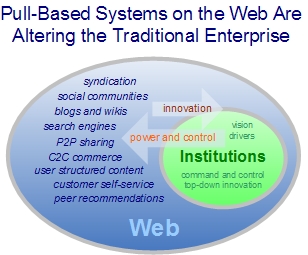The shift to Social Computing

There's been a lot of interest recently in the social aspects of Web 2.0 experiences because of their tendency to alter the communities that use them. As part of tracking this, I wrote recently about McKinsey and Co.'s discussion of coming Interaction Age that discusses how optimizing for high-value tacit interactions between people will become the next major driver of productivity world-wide. A lot of folks call these pull-based interaction systems, which value reputation and trust above all other things, Social Computing.
The generally accepted basic tenets of Social Computing are:
1) Innovation is moving from a top-down to bottom-up model
2) Value is shifting from ownership to experiences
3) Power is moving from institutions to communities
Interestingly, the major computing firms now have dedicated Social Computing research groups including both Microsoft and IBM. And it's an increasingly hot topic in management circles as the implications and issues are surfacing more and more, often because companies are experiencing them directly, such as with Walmart and their hired bloggers.
As another example, Forrester Research, which released a report last month on Social Computing, says that:
[A] new social structure is emerging in which technology puts power in communities, not institutions. Forrester calls this evolution Social Computing. Sounds like Web 2.0, right? We think not. And here's why: Web 2.0 is about specific technologies (blogs, podcasts, wikis, etc) that are relatively easy to adopt and master. Social Computing is about the new relationships and power structures that will result. Think of it another way: Web 2.0 is the building of the Interstate Highway System in the 1950s; Social Computing is everything that resulted next (for better or worse): suburban sprawl, energy dependency, efficient commerce, Americans' lust for cheap and easy travel.
Consequently, it appears that the two-way Web is increasingly moving the power out of the hands of trusted institutions and into the hands of everyday users, who decide for themselves what products they should buy, whose information they should consume, what marketing they want. Thus, online communities are increasingly driving the vision of institutions because these technologies put the majority of power into the hands of communities, essentially take it away from existing formal social structures and organizations.
It's a fascinating story and the fall-out is not clear yet of course. Forrester in particularly recently told me their customers are increasingly tracking this and they believe this shift is affecting all major industries, not just media, which up to know has borne the brunt of the disruptive changes driven by the increasingly pervasive and immersive Web.

One thing is clear, that the the technologies of the modern Web are indeed reshaping our society, particularly of the younger generations that spend so much of their time there. The consequences could be dramatic in the same way that the highway systems fundamentally disrupted the railroad industry. And in a similar way, the negative effects could be as big as the positive effects.
Where do you think Web 2.0 and Social Computing is taking us?